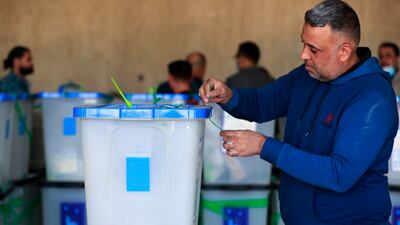Iraq’s new Parliament is set to be inaugurated on Sunday but three months after the election, deeply divided political rivals have not agreed on a new government.
The vote on October 10 was the fifth parliamentary poll since the 2003 invasion that toppled Saddam Hussein.
It was held months earlier than planned, to appease the demands of the pro-reform protest movement that engulfed the country in late 2019. But as in previous elections, no party or coalition was a decisive winner.
To form a majority government, parties must win 50 per cent plus one of the seats in parliament – 165 seats – in the 329-member assembly.
This means parties across the factional political landscape must form coalitions before producing a government.
The Sadrist Bloc, a political group sponsored by populist Shiite cleric Moqtada Al Sadr, emerged with a clear lead of 73 seats. This has pit him against his Shiite rivals.
They include former prime minister Nouri Al Maliki, whose State of Law bloc won 33 seats, and the Iran-backed Fatah Alliance, with 17.
For months, Mr Al Sadr and the Co-ordination Framework, formed by the State of Law and Fatah and other Shiite groups, have failed to reach a consensus.
Sadr and Maliki: old rivals
The enmity between Mr Al Sadr and Mr Al Maliki dates to 2008, when the latter launched a military operation against Al Sadr’s Mahdi Army militia.
In an attempt to melt the ice, the two sides met in Baghdad early last month. This brought Mr Al Sadr face to face with Qais Al Khazali, the founder of the Tehran-backed Asaib Ahl Al Haq militia, a rival splinter group from the Mahdi Army.
Despite a tense atmosphere, politicians said the meeting had helped to ease the political stand-off. But Al Sadr wants to form a majority government with an opposition ally, not one based on consensus among coalitions.
Al Sadr's proposed move away from a broad-tent, inclusive government is a departure from typical government formation talks in previous years. But negotiations are ongoing and an inclusive deal cannot yet be ruled out. Politicians say that despite Mr Al Sadr’s stance, the State of Law could yet be given a role in government.
A subsequent meeting, held at Al Sadr’s house in the southern city Najaf, included Al Khazali, Fatah Alliance leader Hadi Al Amiri and Falih Al Fayyadh, chairman of the Popular Mobilisation Forces umbrella group of paramilitary troops made up mainly of Iran-backed militias.
“Al Sadr tried to dismantle the Co-ordination Framework by telling them ‘come with me to form the government without Al Maliki’,” a politician from State of Law told The National. “But they refused.”
A Sadrist politician confirmed Mr Al Sadr’s attempt to peel away support from State of Law.
In addition to intra-Shiite tension, rifts are growing among Sunnis and Kurds.
The Taqadum party led by former parliament speaker Mohammed Al Halbousi, secured 37 seats, while another Sunni group, the rival Azim coalition led by tycoon Khamis Al Khanjar, won 17.
Both groups have agreed on forming a coalition inside parliament, but not on whether to support the nomination of Al Halbousi as parliament speaker, nor how to divide ministries allocated for members of their sect, a Sunni politician said.
Although the two main Kurdish parties have agreed on a unified stance in government formation, they are far from agreeing on a nominee for the presidency. The Kurdistan Democratic Party won 31 seats, and its rival Kurdistan Alliance, led by the rival Patriotic Union of Kurdistan, won only 17.
Iran pushes for more time
Sunni politician Mishaan Al Jabouri said the Co-Ordination Framework and Iran are pushing to postpone voting in Sunday’s session.
“They have been trying to convince us to postpone the vote on the parliament speaker post,” he told Al Sharqiyah TV on Friday.
“They want the first session only to be for taking the oath in order to allow more time for the negotiations.”
On Friday, Mr Al Sadr said “foreign intervention will not deter us from forming a national majority government as per the will of the people”.
He also hinted at the possibility of forming a coalition with Sunnis, Kurds and some Shiites other than the Co-ordination Framework.
According the constitution, a new speaker and two deputies must be elected during the first session. It is customary for the speaker to be a Sunni Arab, with Kurdish and Shiite deputies.
After that, parliament has 30 days to elect a new president, a post that is reserved for Kurds. The president must then ask the biggest bloc’s nominee to form the government within 15 days.
The prime minister-designate, a Shiite, is required to submit his Cabinet within a maximum period of 30 days from the date of the assignment.
On Friday, in a sign that a final deal is still far from reach, parliament issued the agenda for the first session.
It confirmed the session would be to receive nominations for the speaker and two deputies.


